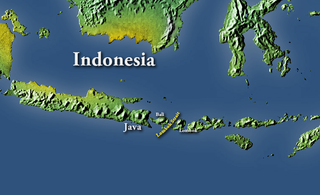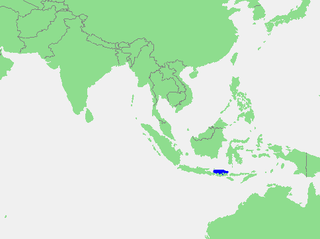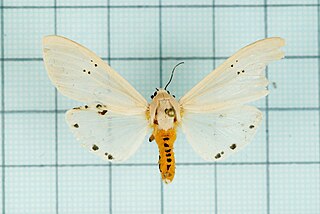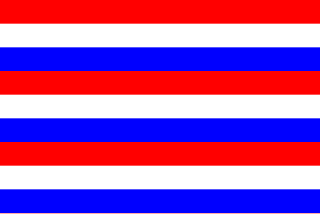
Lombok is an island in West Nusa Tenggara province, Indonesia. It forms part of the chain of the Lesser Sunda Islands, with the Lombok Strait separating it from Bali to the west and the Alas Strait between it and Sumbawa to the east. It is roughly circular, with a "tail" to the southwest, about 70 kilometres across and a total area of about 4,514 square kilometres. The provincial capital and largest city on the island is Mataram.

The Lombok Strait, is a strait connecting the Java Sea to the Indian Ocean, and is located between the islands of Bali and Lombok in Indonesia. The Gili Islands are on the Lombok side.

The Wallace Line or Wallace's Line is a faunal boundary line drawn in 1859 by the British naturalist Alfred Russel Wallace and named by English biologist Thomas Henry Huxley that separates the ecozones of Asia and Wallacea, a transitional zone between Asia and Australia. West of the line are found organisms related to Asiatic species; to the east, a mixture of species of Asian and Australian origin is present. Wallace noticed this clear division during his travels through the East Indies in the 19th century.

West Nusa Tenggara is a province of Indonesia. It comprises the western portion of the Lesser Sunda Islands, with the exception of Bali which is its own province. Mataram, on Lombok, is the capital and largest city of the province. The 2010 census recorded the population at 4,500,212; the total rose to 4,830,118 at the 2015 Census; the latest official estimate is 5,152,400. The province's area is 19,708.79 km2. The two largest islands in the province are Lombok in the west and the larger Sumbawa island in the east.

USS John D. Edwards (DD-216) was a Clemson-class destroyer in the United States Navy during World War II. She was named for Lieutenant John D. Edwards.

Euploea eunice, commonly called blue-banded king crow, is a butterfly found in the Indomalayan realm that belongs to the crows and tigers, that is, the Danaid group of the brush-footed butterflies family.

Danghyang Nirartha, also known as Pedanda Shakti Wawu Rauh, was a Shaivite religious figure in Bali and a Hindu traveler during the 16th century. He was the founder of the Shaivite priesthood in Bali.

The Bali Sea is the body of water north of the island of Bali and south of Kangean Island in Indonesia. The sea forms the south-west part of the Flores Sea, and the Madura Strait opens into it from the west.

Anodendron is a genus of plant in the family Apocynaceae first described as a genus in 1844. It is native to China, the Indian Subcontinent, Southeast Asia, New Guinea, and some islands of the western Pacific.
- Anodendron affine(Hook. & Arn.) Druce - China, Japan, Ryukyu Islands, Philippines, Vietnam, Laos, Thailand, Myanmar, Bangladesh
- Anodendron axillareMerr. - Philippines, Borneo, W Malaysia, Java, Sumatra
- Anodendron benthamianumHemsl. - Taiwan
- Anodendron borneense(King & Gamble) D.J.Middleton - Borneo, Palawan
- Anodendron candolleanumWight - Thailand, W Malaysia, Borneo, Java, Sumatra, Philippines
- Anodendron coriaceum(Blume) Miq. - Thailand, W Malaysia, Borneo, Java, Bali, Lombok, Timor, Flores
- Anodendron gracile(King & Gamble) D.J.Middleton - Borneo, Palawan, W Malaysia
- Anodendron howiiTsiang - Guangxi, Hainan
- Anodendron nervosumKerr - Yunnan, Assam, Laos, Thailand, Vietnam, Java, Sumatra
- Anodendron oblongifoliumHemsl. - Borneo, Philippines, Maluku, New Guinea, Bismarck Archipelago, Solomon Islands, Vanuatu
- Anodendron paniculatum(Roxb.) A.DC. - India, Bangladesh, Sri Lanka, Andaman & Nicobar Is, Malaysia, Indonesia, Philippines
- Anodendron pauciflorumHook.f - Borneo, W Malaysia, Sumatra
- Anodendron punctatumTsiang - Cambodia, Thailand, Guangxi, Hainan, Sichuan
- Anodendron seramenseD.J.Middleton - Maluku
- Anodendron tubulosum(Ridl. ex Burkill & M.R.Hend.) D.J.Middleton - W Malaysia, Sumatra
- Anodendron whitmoreiD.J.Middleton - Maluku, New Guinea, Solomon Islands
- Anodendron wrayiKing & Gamble - W Malaysia

Phaleria is flowering plant genus of about 20 species in the family Thymelaeaceae.

The Dutch intervention in Northern Bali in 1846 was the first in a long series of Dutch military interventions on Bali island, until total control was achieved with the Dutch intervention in Bali in 1908. The Dutch used as a pretext Balinese salvage claims over shipwrecks, which were customary to the Balinese, but unacceptable to the Dutch.

Creatonotos transiens is a moth of the family Erebidae. The species was first described in Western literature by Francis Walker in 1855. It is found in China, Taiwan, Japan (Ryukyu), eastern Afghanistan, Pakistan, India, Bangladesh, Nepal, Bhutan, Myanmar, Indochina, the Philippines, Borneo, Sulawesi and Lombok. It is found in various secondary habitats.

Allotinus unicolor, the lesser darkie, is a butterfly in the family Lycaenidae. It was described by Cajetan and Rudolf Felder in 1865. It is found in Asia.

With more than 13,000 islands and warm water all year, Indonesia is considered an idyllic destination for surfing.
Cymaria is a genus of plants in the family Lamiaceae, first described in 1830. It is native to China, New Guinea, and Southeast Asia.

Drupadia ravindra, common name common posy, is a butterfly in the family Lycaenidae.

The Kingdom of Bali was a series of Hindu-Buddhist kingdoms that once ruled some parts of the volcanic island of Bali, in Lesser Sunda Islands, Indonesia. With a history of native Balinese kingship spanning from the early 10th to early 20th centuries, Balinese kingdoms demonstrated sophisticated Balinese court culture where native elements of spirit and ancestral reverence combined with Hindu influences – adopted from India through ancient Java intermediary – flourished, enriched and shaped the Balinese culture.

The Lesser Sunda Islands are a group of islands in Maritime Southeast Asia, north of Australia. Together with the Greater Sunda Islands to the west they make up the Sunda Islands. The islands are part of a volcanic arc, the Sunda Arc, formed by subduction along the Sunda Trench in the Java Sea.

Euthalia adonia is a butterfly of the family Nymphalidae (Limenitidinae). It is found in the Indomalayan realm.

















